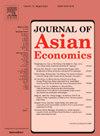数字赋能减少空气污染:城市网络基础设施建设对PM2.5的影响
IF 2.9
3区 经济学
Q1 ECONOMICS
引用次数: 0
摘要
以网络基础设施为特征的数字经济有可能克服时间和空间限制,从而加强空气污染治理。本文采用具有代表性的数字经济政策——宽带中国试点(BCP)政策作为准自然实验,评估其对PM2.5的影响,并探讨其潜在机制。结果表明:(1)BCP政策显著降低PM2.5;(2) BCP政策对雾霾的缓解受规模效应、结构效应和技术效应的驱动;(3) BCP政策在南方地区和人力资本水平较高的城市缓解雾霾的效果尤为明显。这一政策不仅产生了环境效益,还提高了社会福利。此外,同时实施BCP政策和碳减排政策,或BCP政策和创新政策的城市在减少雾霾方面具有协同效应。本文章由计算机程序翻译,如有差异,请以英文原文为准。
Digital empowerment to reduce air pollution: The impact of urban network infrastructure construction on PM2.5
The digital economy, characterized by its focus on network infrastructure, has the potential to overcome temporal and spatial limitations, thereby enhancing air pollution governance. This paper employs the Broadband China Pilot (BCP) policy, a representative digital economy policy, as a quasi-natural experiment to evaluate its impact on PM2.5 and to explore underlying mechanisms. The findings reveal that: (1) the BCP policy significantly decreases PM2.5; (2) the reduction in haze attributed to the BCP policy is driven by the scale effect, structure effect, and technology effect; (3) the effectiveness of the BCP policy in mitigating haze is particularly pronounced in southern regions and cities with high levels of human capital. This policy not only generates environmental benefits but also enhances social welfare. Furthermore, cities that implement both the BCP policy and the carbon reduction policy, or the BCP policy and the innovation policy, experience a synergistic effect in reducing haze.
求助全文
通过发布文献求助,成功后即可免费获取论文全文。
去求助
来源期刊

Journal of Asian Economics
ECONOMICS-
CiteScore
4.70
自引率
9.40%
发文量
90
期刊介绍:
The Journal of Asian Economics provides a forum for publication of increasingly growing research in Asian economic studies and a unique forum for continental Asian economic studies with focus on (i) special studies in adaptive innovation paradigms in Asian economic regimes, (ii) studies relative to unique dimensions of Asian economic development paradigm, as they are investigated by researchers, (iii) comparative studies of development paradigms in other developing continents, Latin America and Africa, (iv) the emerging new pattern of comparative advantages between Asian countries and the United States and North America.
 求助内容:
求助内容: 应助结果提醒方式:
应助结果提醒方式:


